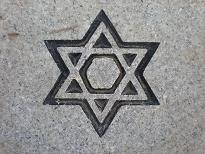I have to say that I am rather enjoying writing the posts in this series. Not only have I been able to share with you information that I already knew, but I have also set out to research things that I don’t know. Religion plays a huge role in researching our ancestors, and I am happy to be learning more about the various religions while sharing it with you.
So far this series has covered the Quakers & Shakers, Anabaptists, and Huguenots & Doukhobors. Today my focus is going to be on the Jews.
Jews practice the religion of Judaism, which follows the beliefs and traditions of the Hebrew bible, Tanakh. Judaism originated more than 3,000 years ago, and is the oldest surviving monotheistic religion (meaning, the belief that there is only one God). There are currently approximately 13 million Jews worldwide, with 40 percent residing in the United States.
It should come as no surprise that the Jewish religion has a heartbreaking history. From 1933 to 1945 Jews were subject to persecution and genocide by Adolph Hitler and his army of Nazis. This is referred to as the Holocaust, which roughly translates into “sacrifice by fire.” Six million Jews were murdered during the Holocaust.
Jewish genealogy can pose some major challenges, especially since the religion does not require birth records. However, most American Jews name their children after deceased relatives, which can provide clues to locate other ancestors and their approximate date of death (before the birth of the child he/she is named after). Clues for birth dates can also be found with mohels, people who perform ritual circumcisions. While not required, many mohels kept records of the circumcisions they performed. Be warned, though, that finding these records can pose another challenge.
Marriage records, called ketubot, are presented to the bride to keep. They are written in Aramaic, and contain the date and place of marriage.
Synagogues keep accurate death records, but knowing which synagogue to check can be difficult. These records may be kept at the synagogue where the deceased person was a member, or the synagogue of the deceased person’s child, or other relative.
You can find additional information by visiting these online Jewish Genealogy Resources:
United States Holocaust Memorial Museum


